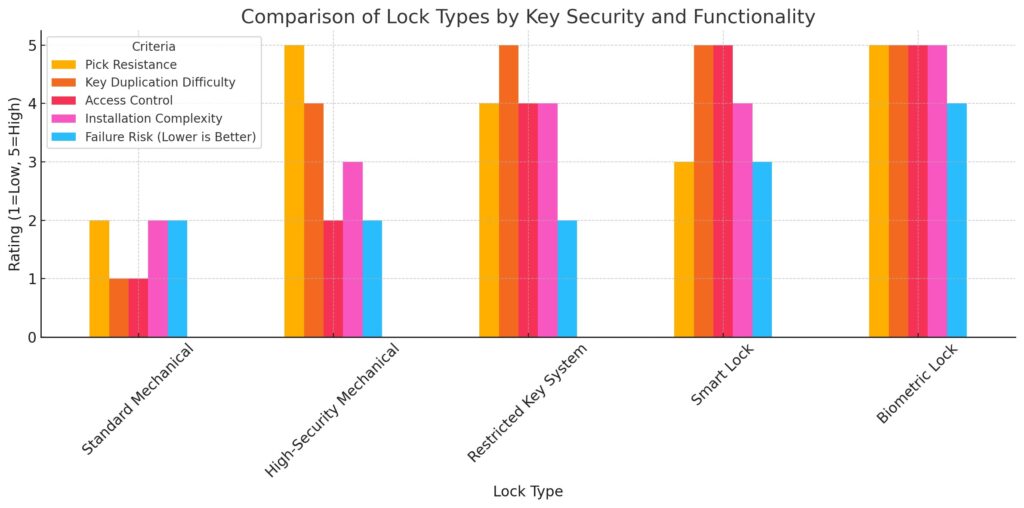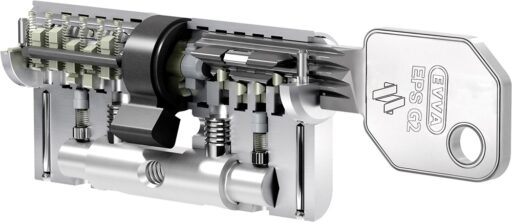Understanding Restricted and High-Security Keys
Not all keys are created equal. While standard keys can be easily duplicated at most hardware stores, high-security and restricted keys are designed with features that make unauthorized duplication significantly more difficult.
In Boca Raton, Davie, South Beach, and across Florida it’s not impossible to replicate any lock or key system. However certain high security locks and key systems are crafted with features that make unauthorized duplication more difficult. Here are some options that enhance control;
1. Patented Keyways and Restricted Key Systems
Restricted keys are part of systems where duplication is tightly controlled. These keys often have unique, patented keyways—specific shapes and profiles that are legally protected and only available to authorized locksmiths. This means that unauthorized individuals cannot legally or easily obtain the blanks necessary to duplicate these keys.
2. Advanced Lock Mechanisms
High-security locks incorporate complex mechanisms that go beyond the standard pin-and-tumbler design. Features such as sidebars, rotating pins, and magnetic elements require keys to have precise cuts and alignments, making unauthorized duplication exceedingly difficult.
The Importance of Key Control
Key control refers to the ability to manage who has access to your keys and how they are duplicated. Implementing a restricted key system enhances key control by ensuring that only authorized individuals can request duplicates, and all duplication requests are logged and monitored.
What About Smart Locks and Biometric Systems?
Unlike traditional locks that rely on physical keys — which can be lost, stolen, or duplicated — smart locks and biometric systems offer a fundamentally different approach to access control. Smart locks eliminate the key entirely, using encrypted digital credentials like PIN codes, mobile apps, or Bluetooth pairing. These credentials can be managed remotely, revoked instantly, and monitored through access logs — providing a level of control and flexibility impossible with physical keys.
Biometric locks go a step further by using unique identifiers such as fingerprints or retinal scans, which are virtually impossible to replicate. In contrast to mechanical locks that depend on precise cuts in metal, biometric and smart systems rely on encrypted authentication, making unauthorized access through duplication practically impossible. These solutions are particularly valuable in high-risk settings or locations that require frequent access changes, such as rental properties, shared office spaces, or healthcare facilities.

No Lock Is Foolproof: Stay Informed and Prepared
While high-security, smart, and biometric locks dramatically improve protection and access control, it’s important to remember that no locking system is invulnerable. Every type of lock — from traditional deadbolts to state-of-the-art smart systems — has potential weaknesses if not properly installed, maintained, or monitored. It’s why contacting and hiritng a professional locksmith is so important.
Smart locks, for example, can be susceptible to software vulnerabilities, weak passwords, or hacking attempts if not regularly updated or secured with strong credentials. Biometric locks, while difficult to spoof physically, may malfunction due to sensor wear, environmental conditions (e.g., dirt, moisture), or simply fail to recognize a user during an emergency.
Even restricted key systems, while excellent for key control, can still be defeated by forced entry or by insiders with authorized access.
Tips to Stay Secure:
- Regularly update software and firmware on smart locks.
- Use strong, unique PINs or passcodes, and avoid reusing credentials across devices.
- Perform routine maintenance on biometric sensors and mechanical components.
- Keep a secondary access method (like a physical key or backup code) in a secure location.
- Limit who has access and monitor access logs or usage history if available.
- Work with licensed, reputable locksmiths to ensure installation meets security standards.
Security isn’t a one-time solution — it’s an ongoing practice. Choosing a secure lock is step one; staying informed and proactive is what keeps it effective over time.
Real-World Implications
In an era where security breaches can have significant consequences, investing in high-security locks and restricted key systems is a proactive measure to protect your property. These systems are particularly beneficial for businesses, institutions, and individuals who require stringent access control and accountability.
Need Help Choosing or Installing the Right Lock?
At Professional Locksmith , we’ve helped thousands of homeowners and businesses across South Florida secure their properties with Grade 1 hardware, weather-resistant systems, and modern smart locks.
Call us today or contact us for expert advice and installation
Want to know what our favorite Medeco locks are? Want to know how to choose the right high-security locks?
Want to know more about us? Still have some questions?
Check out our many other pages for your locksmithing needs.

